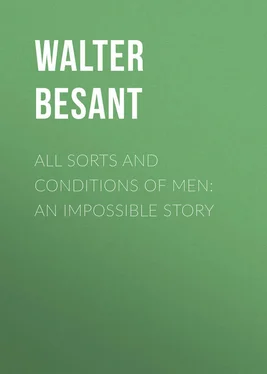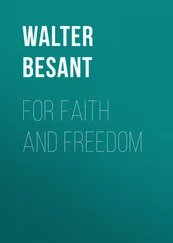Walter Besant - All Sorts and Conditions of Men - An Impossible Story
Здесь есть возможность читать онлайн «Walter Besant - All Sorts and Conditions of Men - An Impossible Story» — ознакомительный отрывок электронной книги совершенно бесплатно, а после прочтения отрывка купить полную версию. В некоторых случаях можно слушать аудио, скачать через торрент в формате fb2 и присутствует краткое содержание. Жанр: foreign_antique, foreign_prose, на английском языке. Описание произведения, (предисловие) а так же отзывы посетителей доступны на портале библиотеки ЛибКат.
- Название:All Sorts and Conditions of Men: An Impossible Story
- Автор:
- Жанр:
- Год:неизвестен
- ISBN:нет данных
- Рейтинг книги:4 / 5. Голосов: 1
-
Избранное:Добавить в избранное
- Отзывы:
-
Ваша оценка:
- 80
- 1
- 2
- 3
- 4
- 5
All Sorts and Conditions of Men: An Impossible Story: краткое содержание, описание и аннотация
Предлагаем к чтению аннотацию, описание, краткое содержание или предисловие (зависит от того, что написал сам автор книги «All Sorts and Conditions of Men: An Impossible Story»). Если вы не нашли необходимую информацию о книге — напишите в комментариях, мы постараемся отыскать её.
All Sorts and Conditions of Men: An Impossible Story — читать онлайн ознакомительный отрывок
Ниже представлен текст книги, разбитый по страницам. Система сохранения места последней прочитанной страницы, позволяет с удобством читать онлайн бесплатно книгу «All Sorts and Conditions of Men: An Impossible Story», без необходимости каждый раз заново искать на чём Вы остановились. Поставьте закладку, и сможете в любой момент перейти на страницу, на которой закончили чтение.
Интервал:
Закладка:
"That seems strange. What are they?"
"Why, he's minister of the Seventh-Day Independents. They've got a chapel in Redman's Row; they have their services on Saturday because, they say – and it seems true – that the Fourth Commandment has never been abolished any more than the rest of them. I wonder the bishops don't take it up. Well, there it is. On Saturdays she won't work, and on Sundays she don't like to, because the other people don't."
"Has she any religious objection," asked Angela, "to working on Monday and Tuesday?"
"No; and I'll send her over, Miss Kennedy, this evening, if you will see her. You'll get her cheap, because no one else will have her. Very good. Then there is Nelly Sorensen. I know she would like to go out, but her father is particular. Not that he's any right to be, being a pauper. If a man like me or the late Mr. Messenger, my friend, chooses to be particular, it's nothing but right. As for Captain Sorensen – why, it's the pride after the fall, instead of before it. Which makes it, to a substantial man, sickenin'."
"Who is Captain Sorensen?"
"He lives in the asylum along the Whitechapel Road, only ten minutes or so from here. Nelly Sorensen is as clever a work-woman as you will get. If I were you, Miss Kennedy, I would go and find her at home. Then you can see her work and talk to her. As for her father, keep him in his right place. Pride in an almshouse! Why, you'd hardly believe it; but I wanted to put his girl in a shop where they employ fifty hands, and he wouldn't have it, because he didn't like the character of the proprietor. Said he was a grinder and an oppressor. My answer to such is, and always will be, 'Take it or leave it.' If they won't take it, there's heaps that must. As old Mr. Messenger used to say, 'Bunker, my friend,' or 'Bunker, my only friend,' sometimes, 'Your remarks is true wisdom.' Yes, Miss Kennedy, I will go with you to show you the way." He looked at his watch. "Half-past four. I dare say it will take half an hour there and back, which with the last quarter of an hour's talk, we shall charge as an hour's time, which is half a crown. Thank you. An hour," he added, with great feeling; "an hour, like a pint of beer, cannot be divided. And on these easy terms, Miss Kennedy, you will find me always ready to work for you from sunrise to sunset, thinking of your interests, even at meals, so as not to split an hour or waste it, and to save trouble in reckoning up."
CHAPTER VII.
THE TRINITY ALMSHOUSE
From Stepney Green to the Trinity Almshouse is not a long way; you have, in fact, little more than to pass through a short street and to cross the road. But the road itself is noteworthy; for, of all the roads which lead into London or out of it, this of Whitechapel is the broadest and the noblest by nature. Man, it is true, has done little to embellish it. There are no avenues of green and spreading lime and plane trees, as, one day, there shall be; there are no stately buildings, towers, spires, miracles of architecture – but only houses and shops, which, whether small or big, are all alike mean, unlovely, and depressing. Yet, in spite of all, a noble road.
This road, which is the promenade, breathing-place, place of resort, place of gossip, place of amusement, and place of business for the greater part of East London, stretches all the way from Aldgate to Stratford, being called first Whitechapel Road, and then the Mile End Road, and then the Stratford Road. Under the first name the road has acquired a reputation of the class called, by moralists, unenviable. The history of police courts records, under the general heading of Whitechapel Road, shows so many free fights, brave robberies, gallant murders, dauntless kickings, cudgellings, pummellings, pocket-pickings, shop-liftings, watch-snatchings, and assaults on constables, with such a brave display of disorderly drunks, that the road has come to be regarded with admiration as one of those Alsatian retreats, growing every day rarer, which are beyond and above the law. It is thought to be a place where manhood and personal bravery reign supreme. Yet the road is not worthy this reputation; it has of late years become orderly; its present condition is dull and law-abiding, brilliant as the past has been, and whatever greatness may be in store for the future. Once out of Whitechapel, and within the respectable regions of Mile End, the road has always been eminently respectable; and as regards dangers, quite safe, ever since they built the bridge over the river Lea, which used now and again to have freshets, and at such times tried to drown harmless people in its ford. Since that bridge was built, in the time of Edward I., it matters not for the freshets. There is not much in the Bow Road when the stranger gets there, in his journey along this great thoroughfare, for him to visit, except its almshouses, which are many; and the beautiful old church of Bow, standing in the middle of the road, crumbling slowly away in the East End fog, with its narrow strips of crowded church-yard. One hopes that before it has quite crumbled away some one will go and make a picture of it – an etching would be the best. At Stratford the road divides, so that you may turn to the right and get to Barking, or to the left and get to Epping Forest. And all the way, for four miles, a broad and noble road, which must have been carved originally out of No Man's Land, in so generous a spirit is it laid out. Angela is now planting it with trees; beneath the trees she will set seats for those who wish to rest. Here and there she will erect drinking-fountains. Whitechapel Road, since her improvements begun, has been transformed; even the bacon shops are beginning to look a little less rusty; and the grocers are trying to live up to the green avenues.
Angela's imagination was fired by this road from the very first, when the idle apprentice took her into it as into a new and strange country. Here, for the first times she realized the meaning of the universal curse, from which only herself and a few others are unnaturally exempted; and this only under heavy penalties and the necessity of finding out their own work for themselves, or it will be the worse for them. People think it better to choose their own work. That is a great mistake. You might just as well want to choose your own disease. In the West End, a good many folk do work – and work pretty hard, some of them – who need not, unless they please; and a good many others work who must, whether they please or no: but somehow the forced labor is pushed into the background. We do not perceive its presence: people drive about in carriages, as if there were nothing to do; people lounge; people have leisure; people do not look pressed or in a hurry, or task-mastered, or told to make bricks without straw.
Here, in the East End, on the other hand, there are no strollers. All day long the place is full of passengers, hasting to and fro, pushing each other aside, with set and anxious faces, each driven by the invisible scourge of necessity which makes slaves of all mankind. Do you know that famous picture of the Israelites in Egypt? Upon the great block of stone, which the poor wretches are painfully dragging, while the cruel lash goads the weak and terrifies the strong, there sits one in authority. He regards the herd of slaves with eyes terrible from their stony gaze. What is it to him whether the feeble suffer and perish, so that the Pharaoh's will be done? The people of the East reminded Angela, who was an on-looker, and had no work to do, of these builders of pyramids: they worked under a taskmaster as relentless as that stony-hearted captain or foreman of works. If the Israelites desisted, they were flogged back to work with cats of many tails; if our workmen desist, they are flogged back by starvation.
"Let us hope," said Harry, to whom Angela imparted a portion of the above reflection and comparison – "let us hope the Pharaoh himself means well and is pitiful." He spoke without his usual flippancy, so that perhaps his remark had some meaning for himself.
Читать дальшеИнтервал:
Закладка:
Похожие книги на «All Sorts and Conditions of Men: An Impossible Story»
Представляем Вашему вниманию похожие книги на «All Sorts and Conditions of Men: An Impossible Story» списком для выбора. Мы отобрали схожую по названию и смыслу литературу в надежде предоставить читателям больше вариантов отыскать новые, интересные, ещё непрочитанные произведения.
Обсуждение, отзывы о книге «All Sorts and Conditions of Men: An Impossible Story» и просто собственные мнения читателей. Оставьте ваши комментарии, напишите, что Вы думаете о произведении, его смысле или главных героях. Укажите что конкретно понравилось, а что нет, и почему Вы так считаете.












